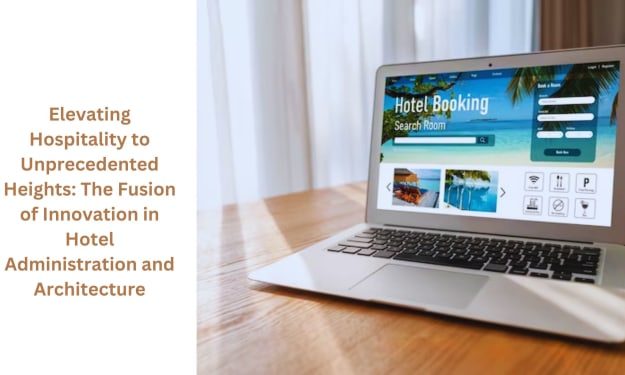Streamlining Hotel Operations: Exploring the Benefits of a Unified Hotel Management Platform
In the rapidly evolving hospitality industry, the importance of seamless operations cannot be overstated. Hoteliers are constantly seeking ways to improve efficiency, enhance guest satisfaction, and maximize revenue.

One solution that has gained significant traction is the adoption of a Unified Hotel Management Platform. This article delves into the benefits of such a platform and how it can streamline hotel operations, revolutionizing the way hotels are managed.
I. Understanding the Unified Hotel Management Platform
A. Definition and Overview
• What is a Unified Hotel Management Platform?
• Key components and functionalities
B. Integration Capabilities
• Streamlining operations by connecting diverse hotel systems
• Centralized data management and accessibility
II. Enhancing Efficiency and Productivity
A. Streamlined Operations
• Automated processes for check-in, check-out, and reservations
• Integration of front office, housekeeping, and inventory management systems
B. Real-Time Insights and Reporting
• Comprehensive analytics and reporting tools
• Access to key performance indicators (KPIs) for data-driven decision-making
III. Optimizing Guest Experience
A. Personalized Services
• Unified guest profiles for a holistic understanding of guest preferences
• Customized experiences based on past interactions and preferences
B. Seamless Communication
• Integration of guest messaging platforms for instant and efficient communication
• Real-time notifications and updates for guest requests or service updates
IV. Maximizing Revenue and Profitability
A. Inventory and Rate Management
• Centralized control of room rates and availability across all distribution channels
• Dynamic pricing strategies for revenue optimization
B. Cross-Selling and Upselling Opportunities
• Integration with ancillary services (spa, restaurant, etc.) for enhanced guest experience
• Automated recommendations and targeted promotions
V. Improved Staff Collaboration and Empowerment
A. Streamlined Internal Communication
• Interdepartmental coordination and communication
• Task management and assignment capabilities
B. Employee Training and Performance Management
• Centralized platform for training modules and performance tracking
• Enhanced visibility of staff performance and achievements
VI. Data Security and Privacy
A. Robust Data Protection Measures
• Compliance with data protection regulations
• Secure data storage and transmission protocols
B. Guest Data Privacy
• Implementing privacy policies and consent management
• Ensuring guest data confidentiality and protection
VII. Seamless Integration with Third-Party Systems
A. Channel Management
• Integration with online travel agencies (OTAs) and global distribution systems (GDS)
• Simplified management of room inventory and rates across multiple channels
B. Property Management System (PMS) Integration
• Seamless connectivity with PMS for streamlined operations and data synchronization
• Real-time updates on reservations, guest information, and billing
VIII. Scalability and Flexibility
A. Adaptability to Different Property Types
• Suitable for small boutique hotels to large chain properties
• Customizable features to meet the specific needs of each property
B. Modular Approach
• Ability to add or remove modules based on changing business requirements
• Scalable infrastructure to accommodate business growth
IX. Enhanced Sustainability and Environmental Responsibility
A. Energy Management
• Integration with energy monitoring systems for optimizing energy usage
• Automated controls for lighting, heating, and cooling systems
B. Waste Management
• Streamlined processes for waste reduction and recycling initiatives
• Monitoring and reporting capabilities for sustainable practices
X. Cost Savings and Return on Investment (ROI)
A. Operational Efficiency
• Reduction in manual processes and paperwork
• Increased staff productivity and time savings
B. Revenue Optimization
• Dynamic pricing strategies for maximizing room revenue
• Cross-selling and upselling opportunities leading to increased ancillary revenue
C. Maintenance and Asset Management
• Proactive maintenance scheduling and asset tracking
• Reduced downtime and improved asset lifespan
XI. Streamlined Maintenance and Housekeeping Operations
A. Preventive Maintenance
• Automated scheduling of preventive maintenance tasks
• Monitoring equipment performance and generating maintenance alerts
B. Work Order Management
• Streamlined process for generating and tracking work orders
• Assigning tasks to maintenance and housekeeping staff efficiently
C. Housekeeping Optimization
• Real-time updates on room status for efficient cleaning and turnover
• Integration with inventory management for timely restocking of amenities
XII. Enhanced Guest Feedback and Reputation Management
A. Online Review Monitoring
• Integration with online review platforms for tracking guest feedback
• Responding to reviews and addressing guest concerns in a timely manner
B. Reputation Management
• Analyzing guest sentiment and identifying areas for improvement
• Leveraging guest feedback to enhance overall guest satisfaction
XIII. Centralized Financial Management
A. Accounting and Financial Reporting
• Using accounting software integration to simplify financial management
• Comprehensive financial reporting and analysis capabilities
B. Revenue Tracking and Forecasting
• Real-time revenue tracking and forecasting tools
• Insights into revenue trends and performance indicators for informed decision-making
XIV. Seamless Multi-Property Management
A. Centralized Control
• Managing multiple properties from a single hotel management platform
• Consistent branding and standardization across properties
B. Inter-property Data Sharing
1. Sharing guest profiles, preferences, and loyalty program information
2. Facilitating seamless guest experiences across different properties
XV. Training and Support
A. Onboarding and Training
• Comprehensive training resources and documentation
• Onsite or remote training sessions for staff members
B. Ongoing Support and Updates
• Access to technical support for troubleshooting and assistance
• Regular updates and enhancements to the platform's features and functionalities
Conclusion:
A Unified Hotel Management Platform offers numerous advantages in streamlining hotel operations. By integrating various systems and functionalities, hotels can enhance efficiency, optimize the guest experience, maximize revenue, and empower their staff. Additionally, the platform ensures data security and privacy, safeguarding guest information. As the hospitality industry continues to evolve, adopting a Unified Hotel Management Platform becomes an essential step for hotels looking to stay competitive and provide exceptional guest experiences.





Comments
There are no comments for this story
Be the first to respond and start the conversation.